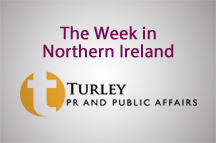 I don’t know about you, but maybe it’s because we’re heading into half term that I feel more than ready for a short break. It seems like someone pressed a ‘GO’ button on the 1st of September and everything suddenly hit 90 miles an hour and stayed there for the last two months. So as we pause for breath, it’s worth taking a look at how the Northern Ireland political landscape has developed since the summer.
I don’t know about you, but maybe it’s because we’re heading into half term that I feel more than ready for a short break. It seems like someone pressed a ‘GO’ button on the 1st of September and everything suddenly hit 90 miles an hour and stayed there for the last two months. So as we pause for breath, it’s worth taking a look at how the Northern Ireland political landscape has developed since the summer.
Obviously, the two big tickets are the arrival of the new age of Opposition, and the hovering anxiety of Brexit. The recent Deloitte ‘State of the State’ report which was so critical of our misfiring Executive 12 months ago has lavished praise on the new set up, highlighting the more cohesive performance of the new DUP / Sinn Fein axis, and championing the development of opposition politics.
“The formation of a first official opposition is a further sign of maturing government in Northern Ireland that will help build confidence in its governance and stability. And effective oppositions do not just hold administrations to account for actions after they have been taken – they help instil a sense of diligence and forethought in ministers and officials keen to avoid criticism.”
It goes on to say,
“Whilst Northern Ireland may be on a promising path, the region is uniquely exposed to Brexit. It will become home to the UK’s only land border with an EU member state, and while the Prime Minister has assured leaders in both Northern Ireland and the Republic that it will not revert to a ‘border of the past’, some form of access and customs control seems inevitable.”
As the DUP prepares for this weekend’s party conference, it can justifiably afford a little laurel resting – an outstanding election, a new leader bedding in effortlessly, and a Programme for Government taking shape. Meanwhile Sinn Fein can be pleased with the performance in particular of its new Health Minister, Michelle O’Neill who launched this week’s Bengoa report on the future of our health service with confidence and energy. The performance of its newest member of the Ministerial team, Chris Hazard in the Infrastructure Department has been solid, with positive announcements handled well.
The performance of the opposition parties, and indeed opposition itself has gotten off to a slightly more shaky start. The first Opposition day was poorly handled, but the new SDLP leader Colum Eastwood’s performance at the Ulster Unionist Conference offered a powerful glimpse of a middle ground attempting to congeal into a force to be reckoned with. Meanwhile this week’s ascension of the hugely impressive Naomi Long to the leadership of the Alliance Party is also worthy of note, as her common sense approach to politics and society has won her many friends over the past decade in politics.
But the Brexitian Banquo remains at the feast, and the fact is that no-one has a clue where it will take us. Northern Ireland has benefitted hugely from EU funding, including €1.3 billion since 1995 for the creation of shared spaces between communities, victim support and urban regeneration. Many of my clients in the voluntary and community sector have justifiable concerns as to future funding.
Northern Ireland’s fishing, farming and food industries are also significantly exposed to Brexit, and I know from attending a number of meetings with local businesses with the Secretary of State that the agri-food and manufacturing sectors are very concerned about its consequences.
 The whole issue has also ignited a relatively dormant sense of nationalism among voters who may well have been content to roll along under the status quo if the vote had gone the way of Remain.
The whole issue has also ignited a relatively dormant sense of nationalism among voters who may well have been content to roll along under the status quo if the vote had gone the way of Remain.
It’s been a busy three months, topped off for myself as our little agency won the Gold Award in both the Public Affairs and the Healthcare sections of last week’s CIPR Awards. Like the rest of you, I’m looking forward to a few days off. Happy Halloween!














